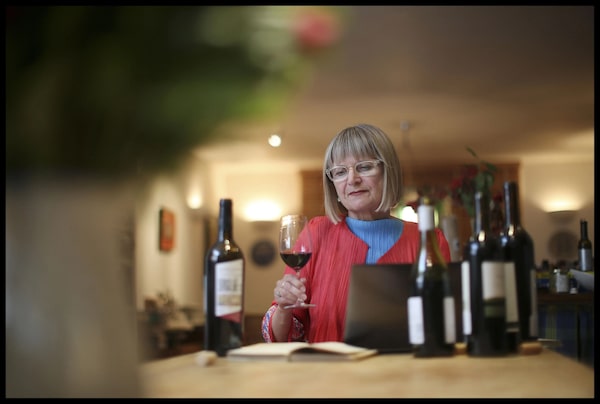
Jancis Robinson sold her subscription-only wine website JancisRobinson.com to U.S. digital publisher Recurrent Ventures in 2021.Supplied
As the world’s most influential wine writer, Jancis Robinson has spread her insight and inspiration throughout the world. The first person outside of the wine trade to become a Master of Wine in 1984, she is the founder and editor of The Oxford Companion to Wine, which recently released its fifth edition, with Julia Harding serving as lead editor for the first time. Robinson is also co-author of The World Atlas of Wine, with Hugh Johnson, and Wine Grapes, which are also standard reference books for wine students and the trade worldwide.
When Robinson’s subscription-only wine website, JancisRobinson.com, sold to U.S. digital publisher Recurrent Ventures in 2021, she took on the role of editor-in-chief and main contributor, saying she had no intention of retiring. She returned to broadcasting, launching An Understanding of Wine, as part of BBC Maestro’s streaming service. The series features lessons focused on tasting techniques, deciphering the language of wine and breaking down wine myths, delivered by Robinson in her usual engaging and accessible manner.
You made your debut talking about wine on television, with The Wine Programme in 1983. How much has changed with the modern An Understanding of Wine series?
I’ve always said, rather nervously, that The Wine Programme was the world’s first television series about wine, and no one’s ever contradicted me. I did three series for Channel Four in the 1980s. And then in the 1990s, we did quite a few things, including an ambitious 10 half hours of the around-the-world program, Jancis Robinson’s Wine Course. Nowadays, it’s great, you don’t have to convince a commissioning editor to spend £1-million, which is what Jancis Robinson’s Wine Course cost even way back then. You can make it so much more easily. And, of course, you can watch it so much more easily, can’t you? Any time, day, or night, and in chunks. We are no longer tied to a broadcasting schedule, which is fantastic.
That content is also accessible to a much wider audience.
Lots of what I do isn’t tied to Britain – it’s reach is international. It’s nice travelling around the world and to have people say, “Oh, I saw you on your course …” The same is true of The Oxford Companion, of course, because it is used by wine students around the world, especially the WSET (Wine Spirit Education Trust) students. That’s not why I did it or the Maestro course, but it’s lovely to feel that you’ve got friends wherever you go, or at least wherever wine is drunk.
You have always embraced the role of wine writer or communicator as opposed to wine critic. Why is that?
Throughout my long professional life, I’ve never ever wanted to preach and say, “This is the one and only truth.” I think that was a valid criticism of American critic Robert Parker: he did give the impression that what he thought about a wine was the one and only truth about it. I’ve just always said, “This is my view.” But you know, everybody has their own sensitivities and partialities. The only truth about a wine is what you think, really.
Do you find that the base level of wine knowledge in your audience has increased? There seems to be more awareness about how wine is made and enjoyed today.
I agree. And, I suspect some quite wine-knowledgeable people have watched the Maestro course just so they can say: “Well, I disagree with her about that.”
Another trend to consider: Global consumption patterns show increased interest in white and rosé wines at the expense of red wines. What do you think is behind this change?
I am thrilled about it because I am a huge fan of white wine. A significant phenomenon is that if you go to a fancy restaurant, which has a tasting menu with wine pairings, which have become quite popular, you get an awful long way down the list of wines before you get a red one. Whites are naturally better partners for really good food than red wine. That’s just one little aspect of why I like white wine.
Does wine appreciation suffer because of younger drinkers who are no longer exposed to classic French wines?
Some wine professionals that are my age have said: “It’s so sad that young people just getting into wine won’t ever be able to afford, you know, a Bordeaux First Growth or Grand Cru.” I honestly don’t think that matters because the world of wine is now unrecognizable compared to when I started. The palette of what you can choose from today is so wide. There are so many different flavours, tastes, provenances and styles that they can go and have a most wonderful time without having to think, “Oh, I’ve never had a Château Lafite.” Younger wine drinkers are wanting to stick the flag into a different place, hence this great vogue for natural wine, orange wines and so on.
Concerns have been raised about younger consumers who are drinking alcohol but aren’t embracing wine. Is there anything the industry can do to attract their interest?
One of the reasons that young people aren’t getting into wine as much is they’ve got to make quite a big financial commitment to buy 75 centilitres (750 mL) of it. I am a fan of basic wines in cans, that are non-breakable, light, easily transportable and you don’t need a special instrument to open them. I am not proposing that Bordeaux First Growths should put themselves in cans, but I think there’s a definite market for other wines in cans or even smaller bottles. Packaging is something that we’re all getting more aware of.
This interview has been edited and condensed.